The 2023/24 season was the first of the Wizards‘ full-fledged rebuild, which was arguably long overdue after five straight campaigns of finishing between 25 and 35 wins. While expectations were very low from a results standpoint, given the dearth of talent on the roster, I don’t think Washington’s new front office, which is run by president Michael Winger and GM Will Dawkins, anticipated the team to be as non-competitive as it was for much of the season — hence the mid-season coaching change from Wes Unseld Jr. to Brian Keefe.
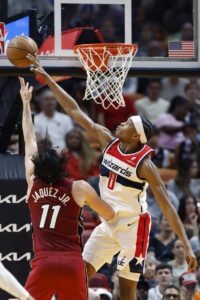 In some ways, the Pistons being as dreadful as they were made things a little easier on the Wizards, since Detroit endured a historic 28-game losing streak and has been abysmal for multiple years now. But the Wizards only finished with one more win and a very similar net rating (-8.7 vs. -9.0; somehow the Hornets had the worst mark in the league at -10.6, while Portland was also at -9.0).
In some ways, the Pistons being as dreadful as they were made things a little easier on the Wizards, since Detroit endured a historic 28-game losing streak and has been abysmal for multiple years now. But the Wizards only finished with one more win and a very similar net rating (-8.7 vs. -9.0; somehow the Hornets had the worst mark in the league at -10.6, while Portland was also at -9.0).
Detroit should be a cautionary tale for Washington of the pitfalls of being a perpetual bottom-feeder. The Wizards will be looking to make incremental gains in the coming season, as there doesn’t appear to be a straightforward way to infuse this roster with star-level talent, even with the addition of the No. 2 overall pick.
That’s not to say the season was a total lost cause. Fourth-year forward Deni Avdija had a breakout season, averaging 14.7 PPG, 7.2 RPG and 3.8 APG on .506/.374/.740 shooting in 75 games (30.1 MPG). It was pretty much a best-case scenario for his development, and the four-year, $55MM rookie scale extension he signed last offseason, which begins in ’24/25 and has a declining structure, looks quite team-friendly now.
Rookie Bilal Coulibaly also showed flashes of tantalizing two-way upside in his age-19 season. As one of the youngest players in his class, the No. 7 overall pick of the 2023 draft is still early in his development, but at minimum, he looks like a promising 3-and-D player with much more room to grow.
One player who has not impressed over his first two seasons is Johnny Davis, who was the last lottery pick (No. 10 overall in 2022) made by the previous front office regime led by Tommy Sheppard. The former Big Ten Player of the Year has struggled in his G League minutes, let alone the NBA, and despite having a real opportunity to carve out playing time at the end of the season amid injuries, he was largely outperformed by players on two-way deals. At this point, it would be a little surprising if the Wizards exercise their fourth-year option on his rookie scale contract.
The Wizards’ Offseason Plan
Hiring a new head coach — Keefe is reportedly in the running and viewed by some as the leading candidate — and selecting a player with All-Star upside in the draft are the top priorities for the Wizards this offseason. The latter is easier said than done, of course.
Some people have compared the 2024 draft class with 2013, which saw Anthony Bennett go No. 1 overall. That draft had three All-Stars, including an all-time great in Giannis Antetokounmpo. It also featured quality players like CJ McCollum, Steven Adams, Kentavious Caldwell-Pope, Otto Porter Jr., Kelly Olynyk, and Dennis Schröder, among others.
After the lottery, general manager Will Dawkins said he believed June’s draft will produce multiple All-Stars, but they will likely take a few years to develop. That’s another clear indication Washington’s new front office is willing to be patient. A recent report indicated they’re trying to get as many low-cost chances as possible at landing a player (or players) who could develop into a star, which makes a lot of sense.
The cap hold for the No. 2 pick ($11,278,680), plus Richaun Holmes opting into his $12,876,780 player option, which is a lock to happen, means operating with cap room probably isn’t practical.
Even if the Wizards waived their non-guaranteed deals and renounced all their cap holds, they wouldn’t be a major player in free agency without attaching assets to move off unwanted salaries (Davis, Holmes, Marvin Bagley III). Going under the cap and using space would also make the Wizards lose access to their non-taxpayer mid-level exception and bi-annual exception, which are available to teams operating over the cap but under the first tax apron.
It’s more complicated than simply signing a player outright, but going the sign-and-trade route could be one option to add free-agent talent. While the Wizards didn’t really have any team-wide strengths in ’23/24, their lack of size, rebounding and interior defense were glaring weaknesses. If I were in the team’s front office, I would be pushing to try and acquire Isaiah Hartenstein in a sign-and-trade with New York.
Of course, the Knicks don’t have to agree to that, which is the primary reason sign-and-trades are more complicated. But New York also only has Hartenstein’s Early Bird rights and is limited to offering him a deal that starts at about $16MM per year. Hartenstein has proven to be a reliable and formidable defender with New York, plus he sets solid screens, crashes the glass, is an above-average passer, and he can even create for himself in a pinch. He’s only 26 years old. While there have been rumors Brooklyn center Nic Claxton could get a lot more money, I think Hartenstein is the more valuable player right now.
That said, I don’t think that scenario is particularly likely, even if having a player like Hartenstein would provide a much-needed presence in the frontcourt. For what it’s worth, The Athletic’s David Aldridge recently made a similar argument pushing for the Wizards to draft UConn center Donovan Clingan with the No. 2 overall pick.
Retaining Tyus Jones past the trade deadline was an indication that Washington will likely re-sign the veteran point guard, preferably to a short-term contract. That might mean paying him a little more annually but for fewer years (maybe he gets something like $35MM over two seasons). It also creates a mid-sized salary for matching purposes, and Jones is very reliable in what he provides, which is a consistently elite assist-to-turnover ratio and solid play-making. I also expect the Wizards to keep Landry Shamet‘s non-guaranteed $11MM deal on the books, as it expires after the ’24/25 season and could be useful in a trade.
Corey Kispert will be eligible for a rookie scale extension this summer and it will be interesting to see if a deal gets done. Winger and Dawkins have already shown a willingness to extend players they inherited (Avdija), and something in the range of $11-13MM annually over three or four years could be a reasonable outcome for both sides.
Kyle Kuzma will certainly pop up in trade rumors again, though it’s unclear if he’ll be moved. The declining nature of his deal — plus the fact that he’s under contract for three more years — means the Wizards can be patient in waiting for what they view as an ideal return package for the 28-year-old.
I do not think the Wizards will find any takers for Jordan Poole, who is owed $95.5MM over the next three years, and that’s fine. While Keefe’s 8-31 record was very similar to Unseld’s 7-36 mark, several players performed better when he became interim coach, including Avdija, Kispert and Poole.
If Poole continues to provide an offensive spark, it will further improve his value and increase Washington’s chances of moving him. He’s only 24 (he turns 25 next month), and I’d still much rather have his deal on the books than Bradley Beal‘s ($161MM over the next three years, with a full no-trade clause).
Salary Cap Situation
Guaranteed Salary
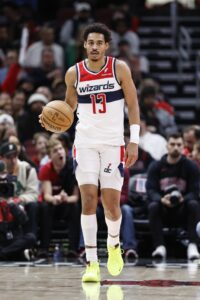 Jordan Poole ($29,651,786)
Jordan Poole ($29,651,786)- Kyle Kuzma ($23,522,727)
- Deni Avdija ($15,625,000)
- Marvin Bagley III ($12,500,000)
- Bilal Coulibaly ($6,945,240)
- Corey Kispert ($5,705,887)
- Johnny Davis ($5,291,160)
- Patrick Baldwin ($2,448,840)
- Total: $101,690,640
Non-Guaranteed Salary
Dead/Retained Salary
Player Options
Team Options
Restricted Free Agents
Two-Way Free Agents
Draft Picks
- No. 2 overall pick ($11,278,680 cap hold)
- No. 26 overall pick ($2,630,040 cap hold)
- No. 51 overall pick (no cap hold)
- Total (cap holds): $13,908,720
Extension-Eligible Players
- Marvin Bagley III (veteran)
- Richaun Holmes (veteran)
- Extension-eligible until June 30 (or beyond, if his player option is exercised).
- Corey Kispert (rookie scale)
- Landry Shamet (veteran)
- Extension-eligible as of October 1.
Note: Unless otherwise indicated, these players are eligible for extensions beginning in July.
Unrestricted Free Agents
Other Cap Holds
- Ian Mahinmi ($23,175,077 cap hold)
- Kendrick Nunn ($6,825,000 cap hold)
- Ty Lawson ($2,093,637 cap hold)
- Shabazz Napier ($2,093,637 cap hold)
- Tomas Satoransky ($2,093,637 cap hold)
- Ramon Sessions ($2,093,637 cap hold)
- Johnathan Williams ($1,867,722 cap hold)
- Cassius Winston ($1,867,722 cap hold)
- Total (cap holds): $42,110,069
Note: The cap holds for these players are on the Wizards’ books from prior seasons because they haven’t been renounced. They can’t be used in a sign-and-trade deal.
Cap Exceptions Available
Note: The Wizards project to be over the cap but below the tax line.
- Non-taxpayer mid-level exception: $12,859,000
- Bi-annual exception: $4,681,000
- Trade exception: $12,402,000
- Trade exception: $9,800,926
- Trade exception: $5,379,250
- Trade exception: $3,500,000
- Trade exception: $1,508,547
- Trade exception: $308,380
- Trade exception: $300,000
Note: Unless otherwise indicated, trade exceptions don’t expire before the regular season begins.
Luke Adams contributed to this post.
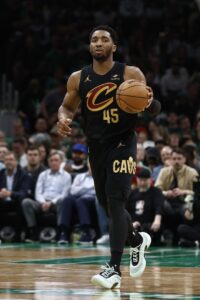 A four-year extension for Mitchell is projected to be worth $200MM+. A new deal would require Mitchell to decline his $37.1MM player option for 2025/26.
A four-year extension for Mitchell is projected to be worth $200MM+. A new deal would require Mitchell to decline his $37.1MM player option for 2025/26.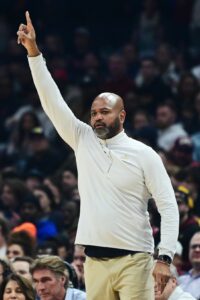 Both The Athletic and ESPN’s Adrian Wojnarowski (
Both The Athletic and ESPN’s Adrian Wojnarowski (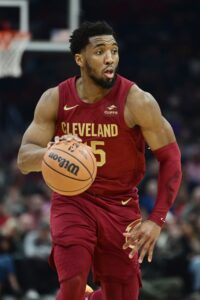 10:51am: Cavaliers star
10:51am: Cavaliers star  In some ways, the Pistons being as dreadful as they were made things a little easier on the Wizards, since Detroit endured a historic 28-game losing streak and has been abysmal for multiple years now. But the Wizards only finished with one more win and a very similar net rating (-8.7 vs. -9.0; somehow the Hornets had the worst mark in the league at -10.6, while Portland was also at -9.0).
In some ways, the Pistons being as dreadful as they were made things a little easier on the Wizards, since Detroit endured a historic 28-game losing streak and has been abysmal for multiple years now. But the Wizards only finished with one more win and a very similar net rating (-8.7 vs. -9.0; somehow the Hornets had the worst mark in the league at -10.6, while Portland was also at -9.0). Jordan Poole
Jordan Poole